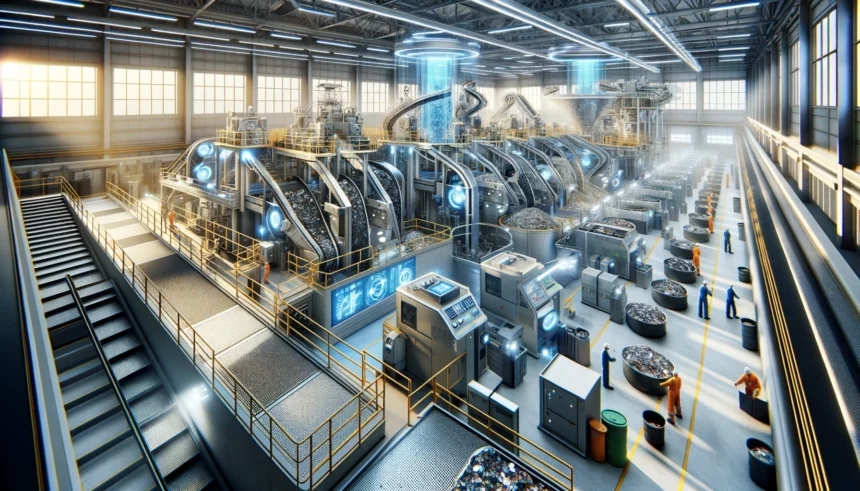Key Takeaways:
- Advanced Sorting Technologies: Sensor-based sorting and AI-powered robots improve sorting efficiency.
- Innovative Recycling Processes: Hydrometallurgical and electrochemical recycling offer more sustainable options.
- Circular Economy Integration: Designing products for recycling and using blockchain for traceability enhance sustainability.
- Economic and Environmental Benefits: Cost savings, increased profitability, and reduced environmental impact drive the adoption of new technologies.
As the global demand for metals keeps increasing, sustainable metal recycling has become more important than ever. Recycling metals helps save natural resources and reduces energy consumption and greenhouse gas emissions. To meet these sustainability goals and boost efficiency, the metal recycling industry is turning to new technologies and innovations. These advancements promise to make the process more efficient, cost-effective, and eco-friendly.
Advanced Sorting Technologies
Sensor-Based Sorting
New sensor-based sorting technologies use various sensors like X-ray fluorescence (XRF), X-ray transmission (XRT), and near-infrared (NIR) to identify and separate metals based on their properties. These sensors can detect a wide range of metals with high precision, greatly improving the efficiency and purity of the recycled materials.
Automated Robotics
Robotic systems with advanced sensors and artificial intelligence (AI) are being developed to automate the sorting process. These robots can quickly and accurately identify and sort different types of metals. AI allows these systems to learn and improve their sorting capabilities over time.
Innovative Recycling Processes
Hydrometallurgical Processes
Traditional high-temperature smelting processes are energy-intensive and produce significant emissions. Hydrometallurgical processes use water-based chemistry to extract metals at lower temperatures. These processes are more energy-efficient and produce fewer pollutants. Innovations are making hydrometallurgy more viable for a wider range of metals, including rare earth elements.
Electrochemical Recycling
Electrochemical recycling uses electric currents to dissolve and separate metals from waste. This method is effective for recovering high-purity metals and is increasingly used for recycling electronic waste (e-waste). Advancements in electrochemical cell design and electrode materials are improving the efficiency and scalability of this technology.
Circular Economy Integration
Product Design for Recycling
Designing products with recycling in mind from the start can enhance the efficiency of metal recovery. This involves using fewer materials, avoiding hazardous substances, and designing for easy disassembly. Companies are adopting eco-design principles to make recycling easier and improve product sustainability.
Digital Tracking and Blockchain
Digital technologies like blockchain are being used to create transparent and traceable supply chains. By tagging and tracking materials throughout their lifecycle, these technologies ensure that metals are properly recycled at the end of their useful life. Blockchain can provide verifiable proof of the origin and composition of recycled metals, enhancing trust and marketability.
Economic and Environmental Benefits
Cost Savings and Revenue Generation
Improved sorting and recycling technologies can reduce operational costs and increase the yield of valuable metals. This enhances profitability for recycling companies and makes recycled metals more competitive with virgin materials. Innovations like hydrometallurgical processes can open new revenue streams by enabling the recovery of previously uneconomical metals.
Environmental Impact Reduction
By reducing the need for primary metal production, advanced recycling technologies help conserve natural resources and lower carbon emissions. The energy savings associated with recycling compared to primary production are substantial, contributing to climate change mitigation. Cleaner recycling processes also reduce the release of pollutants and hazardous waste, protecting ecosystems and human health.
Conclusion
The future of metal recycling looks promising, driven by emerging technologies and innovations that enhance efficiency, reduce environmental impact, and support the circular economy. Advanced sorting technologies, innovative recycling processes, and integration with circular economy principles are key to this transformation. As these technologies continue to evolve, they will help meet the growing demand for metals and contribute to a more sustainable global economy. Embracing these advancements is essential for creating a greener future and ensuring responsible and sustainable use of valuable materials.
















